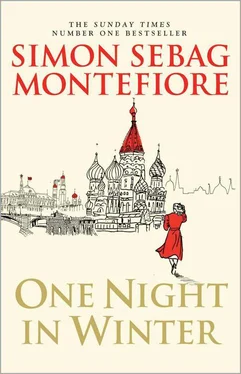She closed her eyes. A drum beat behind them; her temples pounded. If only Genrikh would talk to her; if only he could bend his rules, checks and regulations a little. As it was, she felt utterly alone.
‘Comrade Doctor, you have an appointment in five minutes,’ her assistant blared from the intercom on her desk.
Dashka had two offices: one was in the Ministry of Health and one was here at the Kremlevka, the place where the ‘responsible workers’ were treated by the finest specialists. When she started working there, the Kremlevka had been in the Kremlin itself, but now it stood in a new home on Granovsky, near the building where many of the leaders lived.
The daughter of a cultured Jewish family in Galicia, Dashka had studied medicine in Odessa. After years of working as a cardiologist, she was promoted to the Kremlevka where she had become the trusted doctor to many of the leaders. Most of them suffered from hypertension, arteriosclerosis and other complaints associated with overwork, a fatty diet, stress, lack of exercise, obesity and alcoholism.
Comrade Andreyev: headaches. Treatment: cocaine. Comrade Zhdanov: heart disease and alcoholism. Treatment: total rest and no alcohol. Comrade Beria: overweight. Excessive drinking. Treatment: vegetarian diet.
Then in late 1944, Comrade Molotov had summoned her to the Sovmin – Council of Ministers – in the Kremlin. ‘Sit down, comrade doctor,’ he said in that robotic voice of his. Dashka noticed his spherical head with its pince-nez was connected to his torso without much of a neck. ‘Let me cut to the chase. How do you feel about becoming Health Minister?’
Dashka recoiled in surprise – shock even. ‘I’m a doctor,’ she had protested. ‘Even running the Kremlevka is not ideal. I’ve never worked in government.’
‘Comrade Stalin wishes you to start tomorrow.’ He looked down. In front of him on the desk was a note scrawled in red crayon. During their short meeting, she managed to see that it read: Com. Molotov. Health Minister works poorly. Remove him and appoint lady cardiologist from Kremlevka. J. St.
Comrade Stalin had not even remembered her name, she realized, but she had never met him. She was not particularly ambitious and had never sought such a promotion, so someone must have recommended her. Zhdanov or Beria?
Dashka had a powerful vocation: she adored medicine, loved to help people and she had always aspired to be a doctor. Yes, she enjoyed the fine things in life, especially fashion (preferably imported from Paris), but she lived for her family, more specifically for her children.
Now at 9.30 a.m., she had an appointment that would not normally have concerned her. But she could not stop thinking of Minka and worrying about the other children. She had not slept and the worst of it was that she could do nothing to help them. Nothing at all.
She knew the leaders. She had seen them without their shirts on. She knew their medical secrets and often more, because even Bolshevik grandees felt the need to confide in their doctor.
She was waiting for her next patient, surely a powerful man who could get Minka released. But even asking for special help was against the rules.
No, she must continue as if her darling Minka was not a mile away in a cell in the most dreaded prison in Europe. She raised her hands to her face. She would not let herself cry. She must not!
One of the phones on her desk rang and, shaking herself free of the silent tears running down her face, she rose and answered it.
‘Comrade doctor, the comrade is waiting for you.’
Dashka looked at herself in the mirror. She wore a little mascara to hide her tired brown eyes and her black hair was pulled back in a strict bun but she looked presentable. Her mother had taught her that the greater the challenge, the better you should look. Dashka knew she was a beautiful woman.
She pulled back her shoulders, clipped her stethoscope around her neck, opened the door and gave her dazzling smile. ‘Comrade, come on in.’
‘Comrade Beria is not in his office,’ said the aide who ran Beria’s complicated schedule. ‘Please wait.’ He nodded to Kobylov to take a seat at the far end of the otherwise empty ante-room.
Kobylov grunted and shifted his considerable weight on the leather sofa as he resigned himself to a wait.
After ten minutes, one of the Bakelite phones on the aide’s side desk rang. ‘Comrade Kobylov, Comrade Beria is on the phone for you,’ said the aide.
Kobylov seized it hungrily: ‘Lavrenti Pavlovich,’ he said. ‘We’ve solved it. Yes, I’ll tell you. We’ve closed it! Well…’ Here Kobylov grinned triumphantly at Mogilchuk who was still in awe of Beria. ‘It’s like this: Nikolasha Blagov loves Rosa Shako; she loves him. They want to get married. He’s a fucking degenerate who talks about death all the time; she’s a droopy, simpering rose petal – but he loves her to death. Literally. He hears his father’s being sent off to Mexico. He’s going to lose Rosa. Perhaps never see her again. So he kills her and then himself. Solved!’
A hush except for a tinny voice blaring faintly out of the earpiece. Kobylov straightened up by degrees until he was standing to attention. ‘Right. Of course. We’ll be right down there, Lavrenti Pavlovich!’
Kobylov banged down the phone, feeling his heart racing and his hands sweating.
‘You idiot!’ Grabbing Mogilchuk by the arm and heaving him out of Beria’s antechamber. The moment he was outside, he punched him in the face: ‘This is far from solved and you’ve made a fool of me in front of Comrade Beria!’
‘But I… aah!’ Mogilchuk stepped back and felt his cheek. Stalin had once recommended Management by Punching. It was Bolshevik leadership. But his lip was bleeding. ‘Your rings cut me!’
‘You want another smack in the kisser, you pansy? Come on!’ boomed Kobylov, marching down the corridor and out into the courtyard where a group of drivers waited.
They rode in a Packard down the hill around the Kremlin and up towards Gorky, turning left on to Granovsky. They did not stop at the building where the Satinovs lived, however, but drove on.
At the end of the street, the car turned left into a new building with no name. Two checkpoints waved them through. Kobylov and Mogilchuk, who was by now holding a handkerchief to his mouth, jumped out and hurried up the steps. Nurses in pinafores and a doctor in a white coat were smoking in the lobby of the building where four bodyguards in blue MGB tabs kept watch brandishing PPSh machine-guns.
At the end of the hall, Colonel Nadaraia, Beria’s chief bodyguard, a small sturdy man with fair hair and slightly bulging eyes, was expecting them. He kissed Kobylov with the camaraderie of drinking partners. ‘Hurry up, Bull,’ he said in their native Georgian. ‘And who’s your ginger friend with the bleeding lip? Hurry up. He’s ready!’
One of Nadaraia’s men was holding open the lift even though a handful of doctors and nurses were waiting to get in. They rode down two levels and when the doors opened, they found another two bodyguards waiting.
‘This way!’ said a third, leading them down a corridor with a blue-tiled floor and through two double swing doors. Kobylov noticed that the deeper they went into the building, the colder the air became, the more acrid the stench of formaldehyde and carbolic soap. Finally, they entered a chilly white-tiled room with channels set in the concrete floor, like an abattoir. One entire wall of steel doors faced the men.
‘Ah, there you are, Sherlock Holmes! What kept you? Solving more cases, you fat fool?’ Lavrenti Beria, wearing a summery cream jacket, a flowery Georgian shirt open at the neck and baggy linen trousers, stood between two white slabs. ‘Don’t you think I’ve got better things to do? My wife’s away in Gagra and I’ve got a new fourteen-year-old girl waiting for me at the dacha.’
Читать дальше












